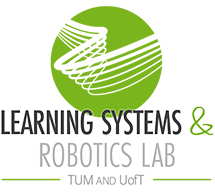The workshop will be virtual and will take place on December 14, 2021.
Overview
Embodied systems are playing an increasingly important role in our lives. Examples include, but are not limited to, autonomous driving, drone delivery, and service robots. In real-world deployments, the systems are required to safely learn and operate under the various sources of uncertainties. As noted in the Roadmap for US Robotics (2020), safe learning and adaptation is a key aspect of next-generation robotics. Learning is ingrained in all components of the robotics software stack including perception, planning, and control. While the safety and robustness of these components have been identified as critical aspects for real-world deployments, open issues and challenges are often discussed separately in the respective communities. In this workshop, we aim to bring together researchers from machine learning, computer vision, robotics, and control to facilitate interdisciplinary discussions on the topic of deployable decision making in embodied systems. Our workshop will feature two discussion themes:
- Theme A: Deployable Learning Algorithms for Embodied Systems
- Theme B: Safe Learning and Decision Making in Uncertain and Unstructured Environments
Invited Speakers | Program | Accepted Papers | Organizers | Program Committee
Invited Speakers
Program
Below is a tentative program of the workshop. Times are in Eastern Standard Time (EST).
Theme A: Deployable Learning Algorithms for Embodied Systems
10:00-10:10 Opening Remarks & Theme A Introduction
10:10-10:30 Invited Talk: Martin Riedmiller, “Reinforcement Learning in Real-World Control Systems”
10:30-10:50 Invited Talk: Shuran Song, “Deployable Robot Learning with Self-supervised Spatial Action Maps”
10:50-11:10 Invited Talk: Nick Roy, “Learning Abstractions for Robust and Tractable Planning”
11:10-11:30 Invited Talk: Aude Billard, “Learning Closed-form Control Law for Adaptive and Fast Decision”
11:30-11:35 Coffee Break
11:35-12:35 Panel Discussion
Spotlights and Poster Session
12:35-13:08 Spotlights
A) Hager Radi, Josiah P. Hanna, Matthew E.Taylor, Peter Stone, “Safe Evaluation For Offline Learning: Are We Ready To Deploy?”
B) Krishan Rana, Vibhavari Dasagi, Jesse Haviland, Ben Talbot, Michael Milford, Niko Sünderhauf, “Zero-Shot Uncertainty-Aware Deployment of Simulation Trained Policies on Real-World Robots”
C) Yunzhu Li, Shuang Li, Vincent Sitzmann, Pulkit Agrawal, Antonio Torralba, “3D Neural Scene Representations for Visuomotor Control”
D) Gal Leibovich, Guy Jacob, Shadi Endrawis, Gal Novik, Aviv Tamar, “Validate on Sim, Detect on Real – Model Selection for Domain Randomization”
E) Ruihan Yang, Minghao Zhang, Nicklas Hansen, Huazhe Xu, Xiaolong Wang, “Learning Vision-Guided Quadrupedal Locomotion End-to-End with Cross-Modal Transformers”
13:08-13:15 Invited Spotlight: Deborah Raji, “Evaluation as a Process for Engineering Responsibility in AI”
13:15-14:00 Poster Session
Theme B: Safe Learning and Decision Making in Uncertain and Unstructured Environments
14:00-14:10 Theme B Introduction
14:10-14:30 Invited Talk: Dragos Margineantu, “Robust Embedded Learned Models”
14:30-14:50 Invited Talk: Yarin Gal, “Human-in-the-loop Bayesian Deep Learning”
14:50-15:10 Invited Talk: Yisong Yue and Ivan Jimenez Rodriguez, “Learning for Agile Control in the Real World: Challenges and Opportunities”
15:10-15:30 Invited Talk: Zico Kolter, “Enforcing Robustness for Neural Network Policies”
15:30-15:45 Coffee Break
15:45-16:45 Panel Discussion
16:45-17:00 Concluding Remarks
17:00-18:00 Social Event
Accepted Papers
The accepted papers are listed as follows.
- “Zero-Shot Uncertainty-Aware Deployment of Simulation Trained Policies on Real-World Robots”, Krishan Rana, Vibhavari Dasagi, Jesse Haviland, Ben Talbot, Michael Milford, and Niko Sünderhauf [PDF]
- “ilpyt: Imitation Learning Research Code Base in PyTorch”, Amanda Vu, Alex Tapley, and Brett Bissey [PDF]
- “Validate on Sim, Detect on Real – Model Selection for Domain Randomization”, Gal Leibovich, Guy Jacob, Shadi Endrawis, Gal Novik, and Aviv Tamar [PDF]
- “Equidistant Hyperspherical Prototypes Improve Uncertainty Quantification”, Gertjan J. Burghouts and Pascal S. M. Mettes [PDF]
- “What Would the Expert do(·)?: Causal Imitation Learning”, Gokul Swamy, Sanjiban Choudhury, J. Andrew Bagnell, and Zhiwei Steven Wu [PDF]
- “Conservative and Adaptive Penalty for Model-Based Safe Reinforcement Learning”, Yecheng Jason Ma, Osbert Bastani, Andrew Shen, and Dinesh Jayaraman [PDF]
- “Scalable Safe Global Optimality in Robot Learning”, Bhavya Sukhija, Matteo Turchetta, David Lindner, Andreas Krause, Sebastian Trimpe, and Dominik Baumann [PDF]
- “Learning Impedance Actions for Safe Reinforcement Learning in Contact-Rich Tasks”, Quantao Yang, Alexander Dürr, Elin Anna Topp, Johannes A. Stork, and Todor Stoyanov [PDF]
- “Extraneousness-Aware Imitation Learning”, Ray C. Zheng, Kaizhe Hu, Boyuan Chen, and Huazhe Xu [PDF]
- “Reward-Based Environment States for Robot Manipulation Policy Learning”, Cédérick Mouliets, Isabelle Ferrané, and Heriberto Cuayáhuitl [PDF]
- “Safe Evaluation For Offline Learning: Are We Ready To Deploy?”, Hager Radi, Josiah P. Hanna, Peter Stone, and Matthew E. Taylor [PDF]
- “Look Closer: Bridging Egocentric and Third-Person Views with Transformers for Robotic Manipulation”, Rishabh Jangir, Nicklas Hansen, Sambaran Ghosal, Mohit Jain, and Xiaolong Wang [PDF]
- “Deep Reinforcement Learning Policies for Underactuated Satellite Attitude Control”, Matteo El Hariry, Andrea Cini, Giacomo Mellone, and Alessandro Balossino [PDF]
- “GRILC: Gradient-based Reprogrammable Iterative Learning Control for Autonomous Systems”, Kuan-Yu Tseng, Jeff S. Shamma, and Geir E. Dullerud [PDF]
- “Learning Vision-Guided Quadrupedal Locomotion End-to-End with Cross-Modal Transformers”, Ruihan Yang, Minghao Zhang, Nicklas Hansen, Huazhe Xu, and Xiaolong Wang [PDF]
- “3D Neural Scene Representations for Visuomotor Control”, Yunzhu Li, Shuang Li, Vincent Sitzmann, Pulkit Agrawal, and Antonio Torralba [PDF]
- “A Unified Approach to Obstacle Avoidance and Motion Planning”, Lukas Huber, Jean-Jacques, and Aude Billard [PDF]
- “Vision-Based Quadrupedal Locomotion in the Wild with Multi-Modal Delay Randomization”, Chieko Sarah Imai, Minghao Zhang, Yuchen Zhang, Marcin Kierebiński, Ruihan Yang, Yuzhe Qin, and Xiaolong Wang [PDF]
Organizers
Program Committee
Trevor Ablett, University of Toronto
Xuchan Bao, University of Toronto
Sarah Dean, UC Berkeley
Ke Dong, Tencent
Xintong Du, University of Toronto
Adam Heins, University of Toronto
Adam Hall, University of Toronto
Gabriel Kalweit, University of Freiburg
Katie Kang, UC Berkeley
James Lucas, University of Toronto
Qiyang Li, UC Berkeley
Chris McKinnon, Applanix
Karime Pereida, Kindred
Jacopo Panerati, University of Toronto
Mengye Ren, University of Toronto
Spencer Richards, Stanford
Guanya Shi, Caltech
Florian Shkurti, University of Toronto
Tim Tang, University of Oxford
Kyriakos Vamvoudakis, Georgia Tech
Zhaoming Xie, University of British Columbia
Justin Yuan, University of Toronto














